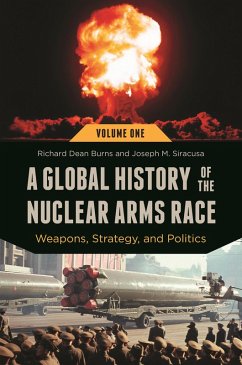Written by two preeminent authors in the field, this book provides an accessible global narrative of the nuclear arms race since 1945 that focuses on the roles of key scientists, military chiefs, and political leaders. The first book of its kind to provide a global perspective of the arms race, this two-volume work connects episodes worldwide involving nuclear weapons in a comprehensive, narrative fashion. Beginning with a discussion of the scientific research of the 1930s and 1940s and the Hiroshima decision, the authors focus on five basic themes: political dimensions, technological developments, military and diplomatic strategies, and impact. The history of the international nuclear arms race is examined within the context of four historical eras: America's nuclear monopoly, America's nuclear superiority, superpower parity, and the post-Cold War era. Information about the historical development of the independent deterrence of Britain, France, and China, as well as the piecemeal deterrence of newcomers Israel, India, Pakistan, and North Korea is also included, as is coverage of the efforts aimed at the international control of nuclear weapons and the diplomatic architecture that underpins the global nuclear non-proliferation regime.



